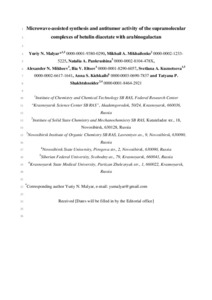Microwave-assisted synthesis and antitumor activity of the supramolecular complexes of betulin diacetate with arabinogalactan
Скачать файл:
URI (для ссылок/цитирований):
https://link.springer.com/article/10.1007%2Fs11696-017-0362-xhttps://elib.sfu-kras.ru/handle/2311/110785
Автор:
Yuriy N. Malyar
Mikhail A. Mikhailenko
Natalia A. Pankrushina
Alexander N. Mikheev
Ilia V. Eltsov
Svetlana A. Kuznetsova
Anna S. Kichkailo
Tatyana P. Shakhtshneider
Коллективный автор:
Институт цветных металлов и материаловедения
Кафедра органической и аналитической химии
Дата:
2018Журнал:
Chemical PapersКвартиль журнала в Scopus:
Q2Квартиль журнала в Web of Science:
Q4Библиографическое описание:
Yuriy N. Malyar. Microwave-assisted synthesis and antitumor activity of the supramolecular complexes of betulin diacetate with arabinogalactan [Текст] / Yuriy N. Malyar, Mikhail A. Mikhailenko, Natalia A. Pankrushina, Alexander N. Mikheev, Ilia V. Eltsov, Svetlana A. Kuznetsova, Anna S. Kichkailo, Tatyana P. Shakhtshneider // Chemical Papers. — 2018. — Т. 72 (№ 3). — С. 1257-1263Аннотация:
In this work, a water-soluble supramolecular complex was synthesized in an aqueous suspension of betulin diacetate (BDA) and arabinogalactan (AG) upon microwave heating. Microwave heating allows reducing the time required for the complex formation, compared with conventional heating in a water bath. The specific effect of microwave irradiation on the initial reagents and preparation of a supramolecular complex was studied. In contrast to conventional heating, under microwave heating AG macromolecules may break into roughly equal fragments when the temperature increases up to 100 oC. A change in the surface morphology of BDA crystals under microwave heating of the suspension suggests that microwave irradiation facilitates the dissolution of BDA in water. It has been shown that the use of dimethylsulfoxide as a reaction medium for microwave heating led to a decrease in BDA content in the product due to the inclusion of DMSO into AG macromolecules. The BDA-AG complex was isolated from the microwave-heated aqueous solution, after water evaporation, as a thin amorphous film, which exhibited antitumor activity against Ehrlich ascites carcinoma cells and can be a promising material for pharmacological applications.

